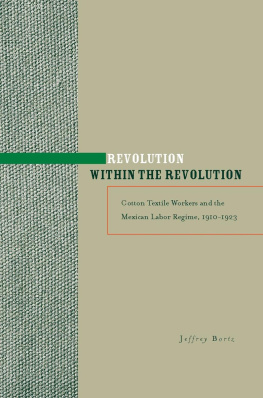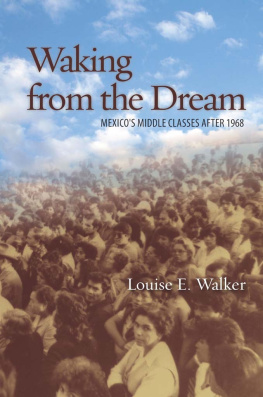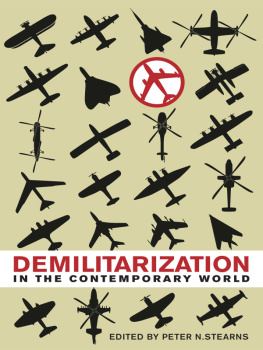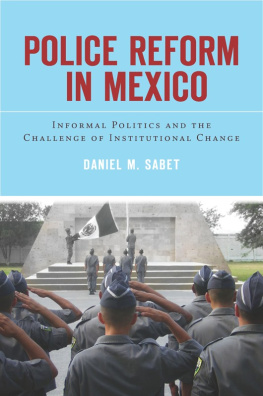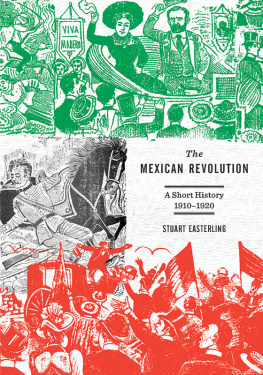Myths of Demilitarization in Postrevolutionary Mexico, 19201960
2013 The University of North Carolina Press
All rights reserved
Manufactured in the United States of America
Parts of this book have been reprinted with permission in revised form from Que el cielo un soldado en cada hijo te dio ... : Conscription, Recalcitrance and Resistance in Mexico in the 1940s, Journal of Latin American Studies 37, no.3 (2005): 50732, and Revolutionary Citizenship versus Institutional Inertia: Cardenismo and the Mexican Army, 19341940, in Forced Marches: Soldiers and Military Caciques in Modern Mexico, edited by Ben Fallaw and Terry Rugeley (Tucson: University of Arizona Press, 2012).
Designed and set in Calluna and Block T by Rebecca Evans.
The paper in this book meets the guidelines for permanence and durability of the Committee on Production Guidelines for Book Longevity of the Council on Library Resources. The University of North Carolina Press has been a member of the Green Press Initiative since 2003.
Library of Congress Cataloging-in-Publication Data
Rath, Thomas
Myths of demilitarization in postrevolutionary Mexico, 19201960/Thomas Rath.
p. cm.
Includes bibliographical references and index.
ISBN 978-0-8078-3928-7 (cloth : alk. paper)ISBN 978-0-8078-3929-4 (pbk. : alk. paper)
1. Civil-military relationsMexicoHistory20th century. 2. Civil supremacy over the militaryMexicoHistory20th century. 3. MexicoArmed ForcesPolitical activityHistory20th century. 4. Mexico. EjrcitoHistory20th century. 5. MexicoPolitics and government19101946. 6. MexicoPolitics and government19461970. I. Title.
JL1220.C58R37 2013
322.5097209041dc23 2012034768
The publisher has made every effort to contact the rightsholder for the cover image. The rightsholder is invited to write to the publisher so that a full acknowledgment may be given in subsequent printings.
cloth 17 16 15 14 13 5 4 3 2 1
paper 17 16 15 14 13 5 4 3 2 1
Contents
CHAPTER ONE
Antimilitarism and Revolution in Mexico
CHAPTER TWO
Cardenismo, Revolutionary Citizenship, and the Redefinition of Mexican Militarism, 19341940
CHAPTER THREE
Heaven Gave You a Soldier for Every Son
Conscription and Resistance in Mexico in the 1940s
CHAPTER FOUR
Civilianism and Its Discontents
Officers, Politics, and the PRI
CHAPTER FIVE
Military Policing and Society in Mexico, 19401960
CHAPTER SIX
The Army, Veterans, and the Historical Memory of the Revolution
Tables
2.1 Annual Base Pay in Pesos of Mexican Army Officers and Enlisted Men, 19251965
3.1 1944 Conscripts, by State
4.1 Number of Mexican Generals in the Army, 19341953
4.2 Total Changes in Zone Command, Average Months in Command, and New Zone Commanders in Each Presidential Term, 19351952
5.1 Infantry Battalions and Cavalry Regiments in Each State and Total Change in Troops, 1940 and 1950
Acknowledgments
Like Napoleons generals, historians require a great deal of luck to make any headway. I am fortunate to have crossed paths with numerous talented and inspiring historians and have enjoyed the support of many colleagues and friends. I am particularly grateful for the friendship, guidance, and high standards of Pablo Piccato. My thanks also to Alan Knight, who has supported this project, tolerated my prose, and provided me with many insights into Mexican history. Nara Milanich, Caterina Pizzigoni, and Paul Gootenberg provided welcome guidance and encouragement at an important stage. Paul Gillingham has also provided unrelenting encouragement and numerous insights from his own superb scholarship. At University College London, Nicola Miller and Christopher Abel first introduced me to Latin American history and culture. Before that, Pelham Lindfield Robertss classes at Atlantic College introduced me to questions about global historical development that I still think about. Many other colleagues have offered support, advice, and encouragement, including, in no particular order, Dennis Gilbert, Ben Fallaw, Ben Smith, Pilar Zazueta, Carlos Glvez-Pea, Julia del Palacio Langer, Cisco Bradley, Jim Krippner, Elena Jackson-Albarrn, Susanne Eineigel, Louise Walker, Bill Beezley, Ingrid Bleynat, Andrew Paxman, Ernie Capello, Matthew Brown, Paulo Drinot, Sinclair Thompson, Jonathan Ablard, Ray Craib, Karin Rosemblatt, Luciano Ciravegna, Kunle Owolabi, Mary Kay Vaughan, Nancy Appelbaum, David Sartorious, Wil Pansters, Kristina Boylan, Taco Terpstra, and Rebecca Bodenheimer.
At different points my research has been supported by the Economic and Social Sciences Research Council, the Latin American Centre (Oxford), the Columbia University Graduate School of Arts and Sciences, the Tinker Foundation, the Whiting Foundation, a visiting fellowship at the University of Maryland (College Park), and a Mellon Foundation Postdoctoral Fellowship in the Arts and Humanities at Hamilton College. I would also like to thank the archival and library staff at the Secretara de la Defensa Nacional, Fideicomiso Archivos Plutarco Elas Calles y Fernando Torreblanca, Archivo General de la Nacin, Secretara de Educacin Pblica, Biblioteca Miguel Lerdo de Tejada, New York Public Library, National Archives and Records Administration, and National Archives (UK). I am also grateful to Elaine Maisner and the staff of the University of North Carolina Press for their professionalism and interest in this project. Over the years the hospitality of the Quiroz Flores family and the distinctive ethos of the Casa de los Amigos have made trips to Mexico doubly inviting and enjoyable.
Friends have provided welcome breaks from academic life: Wil Grace laid on an enjoyable wedding and occasionally sent music; Alex Quiroz provided football, tacos, movies, and assorted other adventures. My parents and sisters have put up with long absences, transatlantic flights, and the no doubt baffling experience of listening to the details of peculiar historical research in a distant land over the phone. They did so with unstinting patience, love, and support, which I can only hope to repay someday. My son, Dev, arrived the same day as my book contract; he has disrupted and rearranged my life in the best possible sense since then. Hema Shenois contributions to this project are innumerable but are only a small fragment of the ways that she has enriched my life. I am grateful for that every day.
Abbreviations
CNCConfederacin Nacional CampesinaCROMConfederacin Regional Obrera MexicanaCTMConfederacin de Trabajadores de MxicoDFSDireccin Federal de SeguridadDGIPSDireccin General de Investigaciones Polticas y SocialesFROCFederacin Regional de Obreros y CampesinosPARMPartido Autntico de la Revolucin MexicanaPNRPartido Nacional RevolucionarioPRIPartido Revolucionario InstitucionalSDNSecretara de la Defensa NacionalSEPecretara de Educacin PblicaUGOCMUnin General de Obreros y Campesinos de MxicoUNVRUnin Nacional de Veteranos de la Revolucin
Myths of Demilitarization in Postrevolutionary Mexico, 19201960
Introduction
On March 10, 1957, twenty soldiers drove into Cuauxocota, a small village in the foothills of the Sierra Norte de Puebla. After threatening to burn the village to the ground, the soldiers rounded up seventeen men, beating a few up in the process, and drove them to the jail in Teziutln, the main town of the region. The lands around Cuauxocota were part of the numerous properties seized by state boss General Maximino vila Camacho and his allies in the late 1930s and early 1940s. The raid was triggered by the villagers plans to contact the federal agrarian department to request that the government accord their settlement its own


